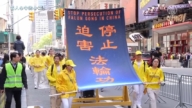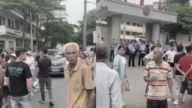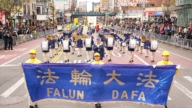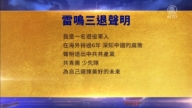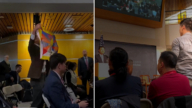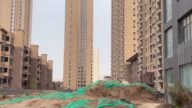【新唐人2011年3月14日訊】中國人究竟幸不幸福呢?今年中共兩會期間,“幸福感”成為了中共代表委員和網民們談論最多的話題。中共聲稱,今年要提升老百姓的幸福感。但評論人士認為,中共所說的幸福其實是官員們的幸福,在中國目前的體制下,貧富差距相當嚴重,民眾根本不會得到真正的幸福。
中國官方媒體《中國日報》在兩會召開前發佈的一項調查說,僅有6%的中國人感到幸福。今年兩會,中共也一直在鼓吹所謂“幸福之風”,聲稱今年要讓老百姓有幸福感。“幸福感”馬上成為了中國各大媒體上出現頻率最高的字眼之一。
那麼,中國大陸的民眾怎麼看“幸福感”這個問題的呢?
自由撰稿人荊楚:“應該是貪官們的幸福,老百姓是沒有任何有幸福感的,只有被欺騙、被壓制、被掠奪這種屈辱,貪官們為所慾為攫取國民創造的財富,他們當然感到幸福了。”
中國日益嚴重的貧富分化引人關注。《美國之音》報導,根據上海“胡潤集團”的統計,以正在召開的人大為例,2,987名代表中最富有的70人總資產為4,931億元人民幣,相當於751億美元。
相比之下,美國華盛頓獨立監督機構政治回應中心(Centre for Responsive Politics)的資料顯示,美國參、眾兩院535名議員中,最富有70人的總資產最高為48億美元。不過,美國的人均GDP是中國的10倍。
此外,「胡潤」統計的資料還顯示,至少有38名人大代表的資產總額超過美國最富有的議員艾薩(Darrell Issa),他的財產總額2009年為4.5億美元。中共人大成為了億萬富豪的俱樂部。
荊楚:“兩會就是權力分贓的會議,把它命名為“排排坐,吃果果”權力分贓會議,因為這些代表根本就不是人民的代表,他只是官僚代表,他不代表人民的利益,他是掠奪人民利益的、漠視民生的,真正是官僚的代表。”
此外,全國人大代表、中國人民大學校長紀寶成在兩會介紹了中國人民大學科研機構的調查報告。報告顯示,10%的富人占有80%的資源,富裕家庭和貧困家庭收入相差近40倍。
荊楚:“貧富懸殊就是一個分配體制的問題,因為在現有的體制下,這個權利得不到制約,不能受到批評,它們就為所慾為,就貪贓枉法,貪污腐敗,老百姓就越來越過得苦,越來越貧困,越來越不像人,僅僅是為了像豬狗一樣活著。”
那麼,中國的老百姓還能期待中共許諾的所謂“幸福感”嗎?
《德國之聲》的評論認為,面對著通貨膨脹的繼續攀高、社會不公的加劇,強徵強拆引起的衝突頻繁爆發,北京政權草木皆兵。因此,這種所謂的“幸福感”的提法,只不過是中共政權採取的胡蘿蔔加大棒的對策,鎮壓伴隨著政權的所謂“施捨”而擴大。
新唐人記者李靜、李璐、特約記者林莉採訪報導。
Carrot and Stick Measures
Are Chinese people happy? This became a hot topic
discussed by CCP』s representatives and the people
during the “two meetings”.
CCP claimed it planned to improve people』s
happiness. However, analysts believe that the CCP
rather referring to the happiness of its officials.
Due to the large income gap between the rich and
poor, mainlanders will never be genuinely happy.
CCP』s official China Daily released a survey result,
showing that only 6% of Chinese people feel happy.
At its “two meetings”, CCP propagandized
“happiness”, claiming that they will make Chinese
people feel happy. “Happiness” instantly became
the media』s hottest topic.
Then what do the Chinese people think about this
“happiness”?
Freelancer Jing Chu: “It is the corrupt officials』
happiness. The common people only feel the
humiliation of being cheated, oppressed and
deprived. The officials grab at will the wealth made
by the people. Of course only they would feel happy.
China’s growing income gap is attracting attention.
Voice of America reported, as per Hurun Group』s
statistics,out of the 2,987 National People’s
Congress reps, the 70 richest people have assets
of RMB 493.1 billion, equivalent to USD 75.1 billion.
In contrast, the U.S. independent oversight body
Centre for Responsive Politics』 data shows that
out of the 535 members of the U.S. Senate and
House, the richest 70 people have assets of
USD 4.8 billion. The U.S. GDP per capita is 10
times that of China.
The Hurun Report shows that at least 38 Chinese
representatives are richer than the richest U.S.
representative Darrell Issa, who had
USD 0.45 billion in 2009. The CCP』s People』s
Congress is a billionaires』 club.
Jing Chu: “The 『two meetings』 are conferences
to divide the spoils of power among the
representatives. These representatives don』t
represent the people. They are the officials』
representatives. They are representing the ones
that deprive the people』s interests, and neglect the
people’s livelihood.”
Representative Ji Baocheng, Principal of China
Renmin University, talked about the results of an
investigation. 10% of the rich people occupy 80%
of the resources. Wealthy families earn nearly
40 times more than poor families.
Jing Chu: “The wealth gap is due to the distribution
system. Under the existing system, power is not
restricted. The powerful cannot be criticized.
So, they do whatever they want, including
corruption. As a result, the people suffer from more
hardships and poverty. They live less like humans
and more like pigs and dogs.”
Can the Chinese people expect CCP』s
promised “happiness”?
Deutsche Welle analyzed that inflation will continue
to rise, social injustice will continue to intensify,
and forced demolitions will invite frequent conflict
outbreaks. The regime in Beijing is extremely
nervous. “Happiness" is just CCP』s 『carrot and stick』
measures. Its oppression will increase
along with its “charity".
NTD reporters Li Jing,Li Lu and Lin Li.



